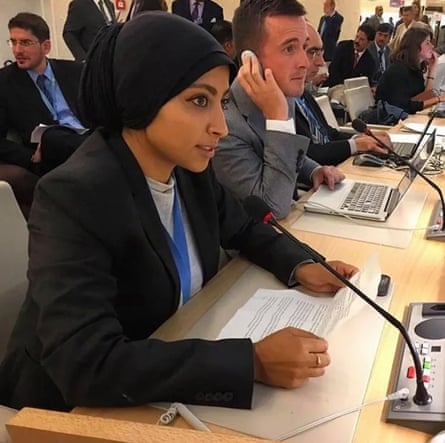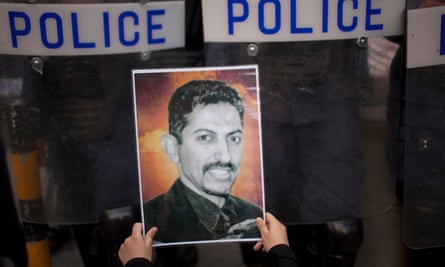[ad_1]
Human rights activist Abdulhadi al-Khawaja’s health has suffered so much inside a Bahraini prison that his daughter Maryam has offered to trade places with him. She fears that without urgent action, her father will slowly die behind bars without being able to see his family.
“I don’t know how much longer my dad has. I spend every day dreading each time the phone rings, as it might be someone calling me to let me know my dad is no longer around,” said Maryam. “I know he has serious health issues and the authorities are using [lack of] access to proper treatment as a method of punishment. I don’t want to wait around for my dad to be released to us in a coffin. I can’t do that.”
She added: “The central issue is that my father shouldn’t be in prison to begin with.”
Khawaja is one of Bahrain’s most prominent human rights campaigners. He has a decades-long history of activism, and was arrested in the dead of night at his family home in April 2011 for his involvement in pro-democracy protests that swept the kingdom. Two months later, he was sentenced to life imprisonment. Twelve years into his sentence, his family say the Danish-Bahraini dual national is being denied crucial medical treatment as punishment for his status as a human rights defender, raising the risk that Khawaja could die behind bars without urgent intervention from the Danish authorities.

He was convicted of terrorism and attempting to overthrow the government, charges that were condemned as politicised by rights groups. The United Nations Working Group on Arbitrary detention declared that the sentence was directly linked to Khawaja’s desire to freely express his political beliefs and participate in protests, despite the Bahraini authorities’ ruling that anti-government protests were illegal. A spokesperson for the Bahraini government, when asked about Khawaja’s case, said that “freedom of expression and opinion is a constitutional right and no one is detained because of their political views or activism.”
Maryam fears the Bahraini authorities’ treatment of her father, owing to his status as a well-known activist and a dual national, are intended to set an example to the estimated 1,400 political prisoners currently in detention in Bahrain, a number that represents roughly half the total prison population in the tiny island country. Her father has also been denied access to a system of alternative punishments that allows prisoners, even those of conscience, to leave detention and work or live under house arrest.
For more than a decade, Khawaja has remained in prison along with other prominent rights activists arrested in 2011, including Abduljalil Abdulla al-Singace, who has been on hunger strike since July 2021 in protest at his treatment in jail. Rights groups say he risks dying behind bars owing to lack of medical care. The activist group has been confined to a single block in the infamous Jau prison in Manama, the capital. Khawaja’s family say say prison authorities have isolated the group from other detainees and have expended additional effort to keep them quiet within the jail. After the group cultivated plants in the prison yard, these were cut down as a punishment.
Khawaja has faced further punishments that his supporters say are intended to silence his efforts to protest against his detention or his treatment at the hands of the interior ministry, which oversees prisons. After the 61-year-old chanted slogans in the prison yard and broke a plastic chair in response to prison authorities revoking his ability to call two of his daughters from detention, he was served with additional charges in recent months including that of insulting a police officer.
“They’re making an example out of him as [news of] his case reaches others. They are using him to ensure that others feel they can’t protest inside prison or continue to conduct activism in prison and get away with it,” said Maryam. “They’re doing everything they can get away with to my father.”
The risks of Khawaja’s continued detention have risen as he weathers the long-term effects of repeated torture, including the multiple fractures to his face that he sustained during his arrest in front of his family. His injuries led to a four-hour-long operation on his jaw that he underwent while handcuffed in a military hospital.
The activist is also suffering from the effects of a hunger strike, including the impact of force-feeding. He has back injuries including a fractured coccyx and an injured shoulder, and his family say he is often forced to wear heavy shackles to travel to hospital for treatment or to ride in vehicles that aggravate his medical conditions.
In early March, Khawaja was rushed to a military hospital suffering heart palpitations and breathing difficulties. A doctor informed him that he was at increased risk of heart attacks and strokes, and urgently needed to see a cardiologist. There is a pattern of denial of proper medical treatment for inmates within the Bahraini prison system, especially for high profile political detainees, according to the US state department. Maryam says that her father has not been able to see a cardiologist, raising further the risk that he could suffer a fatal heart problem and die in captivity.
Despite public announcements from the Bahraini government that Khawaja would see a cardiologist late last week, his appointment has been postponed indefinitely. “Yet again we’re seeing the Bahraini regime denying my father incredibly important medical access, and appointments that he needs to make sure he stays alive,” said Maryam in a video posted online.
after newsletter promotion

With the activist’s health and potentially life on the line, rights groups and his family increasingly demand that the Danish authorities raise his case publicly. “Al-Khawaja needs strong, public pressure from the Danish government to finally secure his release. At 60, his health is deteriorating from multiple health conditions resulting from the severe physical, sexual, and psychological torture he has endured while in detention, as well as a serious lack of medical treatment provided by prison authorities,” said Human Rights Watch in a recent report on his case.
“If my father dies in prison, I will hold the Danish government just as responsible as that of Bahrain. Not in the sense that the Danes are as bad as the Bahrainis, but when it comes to my father specifically, they will be just as responsible as they could have gotten him out of detention,” said Maryam, who is demanding the Danish authorities secure a medical evacuation for her father.
The Danish foreign ministry had little to say when contacted for comment about Khawaja’s case, including Maryam’s offer to trade places with her father. “Denmark closely follows the situation for prisoners and human rights defenders in Bahrain where the Danish-Bahraini human rights defender Abdulhadi al-Khawaja has been in prison since 2011. Denmark is consistently calling for the release of arbitrarily detained persons in Bahrain, including al-Khawaja, ie, in the UN Human Rights Council. As far as al-Khawaja’s specific case is concerned, the ministry of foreign affairs is not in a position to comment further,” it said.
A spokesperson for the Bahraini government also declined to comment on whether it was seriously considering Maryam’s offer, focusing instead on his detention. “The kingdom does not tolerate mistreatment of any kind, and a robust system of checks and balances exists to investigate any complaints or allegations of mistreatment,” the spokesperson said. “Abdulhadi al-Khawaja is serving a sentence for serious terrorism-related crimes following the due legal process. He was not convicted or imprisoned for expressing peaceful political views. All prisoners, including al-Khawaja, have access to family, legal representation, and medical care.”
Maryam, who lives in exile and was jailed briefly in Bahrain in 2014 after travelling there to visit her father, says that she is so scared for his health, she is making preparations in case the Bahraini authorities choose to accept her offer and allow her to trade places with her father in detention, meaning that she risks spending the rest of her life behind bars.
“I don’t know how much more time we have with my dad, and I can’t take that risk,” she said. “Since I decided to do this, every night I struggle to fall asleep as I remember what it’s like to be in prison. This is not something I take lightly, I know what it means,” she said.
[ad_2]




